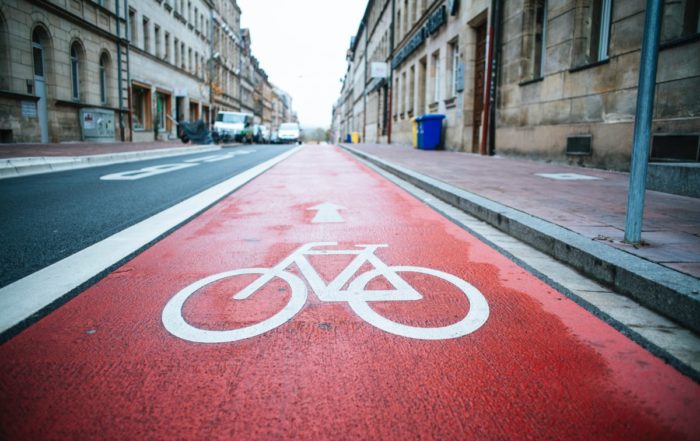What we need is a positive narrative or frame for a future healthy living
Interview with Bernhard Schlag
Values are a basic background of societies, individual preferences and political discussions but they are not directly related to daily behaviour, says Bernhard Schlag. However, for many people mobility has a positive value on its own. They express, for instance, their values and their world views in their individual mobility patterns.
Mobility for its own was, and maybe still is, a very high value. People strive for as much freedom of mobility as they can have. A prominent historic example for the role of mobility is the claim of the East-German protesters for “Reisefreiheit” (freedom to travel) during the peaceful revolution in the former GDR.
Possibly, we face a conflict if we say to these people that mobility is not as good as you think, so that we have to argue very carefully about that. When people fear that they are restricted in their mobility it might have an adverse effect.
In everyday decisions like travel mode choice, the most important factor is that the outcomes should be advantageous. That is far more important than any individualistic values. And car use is in a lot of cases still advantageous because many incentives to use the car remain like e.g. availability of an own car at any time, free choice when and where to travel, or free parking at work. Thus, a very simple solution for behaviour change is to remove incentives for car use and to implement incentives to use other modes.
Did the narrative already change? What are the crucial points in politics?
We need a different idea of mobility as a whole. That starts in the short-term with how we deal with speeding and speed regulation but even more important also in the long term. We need to rebuilt our whole environment. Many western cities (Germany) were destroyed twice states Schlag; Firstly, through World War II and secondly, by rebuilding the cities in favour of cars (car dominant city). This has changed, say, in the last two decades. People’s rules and wishes how to live in cities have changed and city authorities started accepting this.
Now, cities will be redesigned rather in a kind of ‘old fashioned’-way with places where people can meet, stroll or stay. The automobile should be outside the city in order to make the city a living district and not an area for car driving. This process is expensive and will take a long time but it has already started.
In the past, the economic narrative was most dominant in people’s minds but also in political discussions. Everything had to be profitable. Economic development was higher valued than for instance environmental consequences caused by traffic like noise or air pollution. This holds true not only for the transport sector, but also for e.g. the health sector or education.
Major values for people in mode choice
Schlag sees it as a wrong idea that speed serves for many as the main criteria for efficiency. The challenge is not about to maximise rather to get a satisficing outcome. This is referred to as the sufficiency-paradigm and be found practically applied in Switzerland where trains do not operate for speed maximisation but rather for reliability and punctuality in order to reach further connections. However, there is a discrepancy between what people like (e.g. to travel by car, to speed etc.) and what should be done (reducing car dependency, slow down etc.). Nevertheless, Schlag observes a slow movement towards the sufficiency –paradigm, even though it will be a long-term process.
Shift away from symbolic motives towards instrumental motives
The car will lose as reference for demonstrating social status. This, in particular for people, who traditionally valued a car as status symbols, makes it difficult to show social superiority (high status). For instance, to obtain a driving licence is seen much more functional by the current youth.
A possible supplement for the losing importance of cars to demonstrate social status could be the concept of having time or “wasted time” resembling the Arcadia-paradigm.
Arcadia (Greek: Αρκαδία) refers to a vision of harmony with nature. The term is derived from the Greek province of the same name which dates to antiquity; the province’s mountainous topography and sparse population of pastoralists later caused the word Arcadia to develop into a poetic byword for an idyllic vision of unspoiled wilderness. Arcadia is a poetic shaped space associated with bountiful natural splendour and harmony.
Is technology the solution?
Technological innovations like electric cars are not the solution for the mobility of the future; they are rather elements of the old car-centric world. They may help to reduce the negative consequences of car use to some extent but do not contribute to a real solution of particularly modern cities’ struggles. This leads not to a mobility turnaround (Mobilitätswende) but only to a powertrain turnaround. A behaviour change is necessary and in the cities, many residents are ready to do so whereas promising visions for rural areas still lagging behind. In many rural areas people do not only feel car dependent, but car dependency there is the reality. What we need is a positive narrative or frame for a future healthy living. So far, it is not as concrete as it should be. Until now, many people fear about losing something if we speak about new mobility. What we should aim for is a concrete positive narrative, a gain scenario what is missing so far but it seems to be developing in the young generation.
Interviewed by Jens Schade & Lisa-Marie Schaefer, TU Dresden
Related content
Low volume, high frequency
Low volume, high frequency Interview with [...]
If behaviours change, systems change
If behaviours change, systems change Interview with [...]
The concept of sustainability is connected with happiness
The concept of sustainability is connected [...]
What we need is a positive narrative or frame for a future healthy living
What we need is a positive [...]
As for the future we need a more balanced thinking
As for the future, we need [...]






